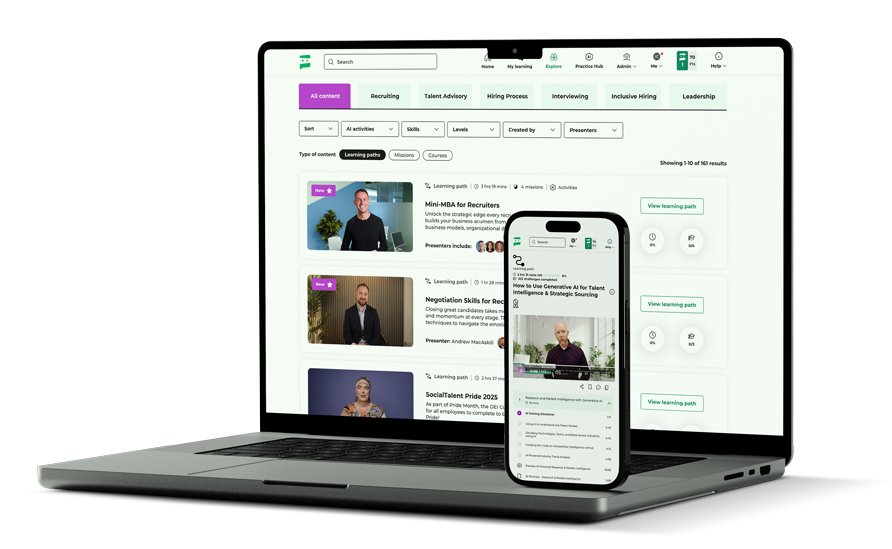
By Johnny Campbell
AI is changing the world of recruiting, there is no question of this. But is it always for the better? Recently, I had a conversation with a leader from a global consulting company who shared a staggering statistic with me: over the past year, their team has noticed that applications have surged by 33%, representing 2 million additional applicants for the same number of roles.
On the surface, this might sound like a great problem to have—more talent in the pipeline, right? But there’s a catch. A significant portion of this increase is attributed to AI-generated applications, many of which are riddled with misinformation or outright lies. This surge isn’t just straining recruiting teams, it’s forcing us to confront fundamental questions about how we screen talent in an AI-driven world.
Let’s dig into the heart of the issue.
The AI Cheating Epidemic
AI tools have made it easier than ever for candidates to mass-apply to jobs. Some candidates use AI ethically—to fine-tune resumes or clarify their experience. That’s great. But others are using it to fabricate credentials, invent achievements, and match job specs with skills they don’t actually possess.
This isn’t just anecdotal. The Financial Times suggest that almost 50% of candidates have used AI to embellish or outright falsify their resumes. The result? Recruiting teams are flooded with polished but unreliable applications. And while the volume is overwhelming, the real challenge is validating who’s telling the truth.
Compounding this problem are global regulations—particularly in the EU—that prohibit the use of AI for decision-making in hiring. While you can use AI to assist in evaluations, you can’t let it reject candidates outright. That leaves us with a paradox:
AI is creating the problem, but we can’t fully leverage AI to fix it.
The Recruiter’s Dilemma: Rising Volumes, Shrinking Teams
Over the last year, budgets in TA have been slashed. Recruiting teams are being asked to do more with less—handling skyrocketing application volumes while operating with reduced headcounts. And when millions of extra resumes flood the system, there simply aren’t enough hours in the day for human recruiters to vet each one.
Here’s the stark truth: no one is manually reviewing every application. It’s just not possible. Teams are relying on stack-ranking tools or screening software to triage applications. But these tools can’t discern a well-written lie from the truth, leaving recruiters stuck with unmanageable numbers of “qualified” candidates.
So how do we solve this?
Fighting AI with… More AI? The Path Forward
I believe the potential solution lies in early-stage assessments—introducing skill or values-based tests at the top of the funnel. This approach allows talent teams to weed out unqualified candidates without relying on AI to make direct decisions.
Here’s how it works:
- Move Assessments Upfront: Instead of waiting until the final stages of the hiring process, place short, high-impact assessments at the application stage.
- Focus on Speed and Fairness: These assessments must be short (think 5–10 minutes) to prevent candidate drop-off. They should also be accurate and AI-proof, ensuring candidates can’t fabricate their way through.
- Offer Candidate Value: To encourage participation, some companies are exploring ways to give candidates personalized feedback or training resources in exchange for completing the assessment. This not only reduces the candidate pool but also provides genuine value to applicants, making the process feel less transactional.
For instance, one company I spoke with is piloting a system where candidates receive detailed insights into their strengths and areas for improvement after completing the assessment. SocialTalent also offers Candidate Training, enabling organizations to give applicants access to specific tools and insights needed to conduct a successful interview. By framing this as a development opportunity, the hope is to attract serious candidates while filtering out those who lack the necessary skills.

The Trade-Off: Efficiency vs. Candidate Experience
While early assessments offer a promising solution, they come with risks. Introducing a test at the application stage inevitably reduces the number of candidates who apply—some high-quality applicants might be put off by the extra step. The challenge is striking the right balance between efficiency and candidate experience.
Moreover, it’s not just about cutting down on volume, it’s about ensuring fairness. If assessments aren’t carefully designed, they risk introducing their own biases or excluding underrepresented talent. That’s why companies must always prioritize inclusivity when developing these tools.
The Bigger Picture: Why This Matters
The rise of AI-generated applications isn’t just a logistical headache, it’s a symptom of deeper shifts in the labor market. Candidates are leveraging technology to stand out in increasingly competitive fields, and recruiters need to adapt. But adaptation doesn’t mean abandoning human judgment. If anything, the goal is to amplify the human touch by freeing up recruiters to focus on the candidates who matter most.
And I want to be clear about something here: this isn’t a fight between AI and recruiters. It’s a call to redesign the hiring process for an era where both sides are armed with powerful tools. The question is, however, are we ready to rise to the challenge?
What’s Next for TA Leaders?
If you’re seeing similar trends—higher volumes, questionable applications, and tighter budgets—it’s time to rethink your funnel:
- Evaluate Your Top-of-Funnel Strategy: Are you using assessments effectively? Can they be shorter, fairer, and more engaging?
- Invest in Candidate Experience: Think about what you can offer candidates in return for their time—feedback, resources, or even training opportunities.
- Collaborate Across Teams: This isn’t just a TA problem. Work with your legal, compliance, and tech teams to design a process that balances efficiency with regulatory compliance.
- Stay Ahead of AI Trends: Candidates are innovating, and so must we. Keep an eye on emerging tools and technologies that can help validate skills without breaking the rules.
At the end of the day, this isn’t just about managing applications, it’s about building a better hiring process. One that’s fairer, smarter, and more human. Let’s get to work!




